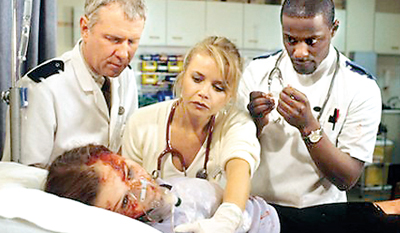Why everybody loves medical dramas
Why are we so fascinated by medical dramas? From the high drama of Casualty and ER to the squeamish reality of Embarrassing Bodies and One Born Every Minute, it is hard to look away. Books with a medical or health theme are equally popular on best-selling lists.

Feeling squeamish yet? The more blood the better...
Without doubt, medical science is a rich source of stories and intrigue. The popularity of all forms of medical-based drama suggests that we love to watch and read about people dealing with pain and discomfort, facing problems we fear we might face too at some point in our lives.
Prof. George Ikkos, president of the UK’s Royal Society of Medicine’s psychiatry section, says it is more to do with learning about ourselves from other people.
“Well-informed programmes can be helpful but people engage at different levels, from the highbrow to the lowbrow, depending on how people relate to what they are watching.”
There is, of course, no research to confirm whether these dramas improve our understanding of medical matters or change our perceptions of health issues.
The themes of health, medicine and science are also at the heart of many works of popular fiction and non-fiction. Best-selling novels such as Before I Go To Sleep by S.J. Watson and Me Before You by Jojo Moyes tackle the subjects of long-term memory loss and life as a paraplegic.
Thomas Wright, whose new book Circulation – a biography of the 17th Century physician William Harvey – won the Wellcome Trust Book Prize this week, does not need to be convinced about the power of medical history. He was attracted to the story behind Harvey’s discovery that the heart was the principal organ of the body, pumping blood through veins and arteries with an incredible force. During an experiment, Wright says, Harvey cut the aorta of an animal and the blood dashed out with such force and quantity that it splattered the room.
“It was so shocking to people who thought blood flowed sluggishly around the body. It’s an image that stayed in my mind.” That dramatic scene opens Wright’s book and he returns to it at the end too.
Wright hopes his book will appeal to the same audience who watch the blood-stained medical dramas on TV.
Courtesy BBC
Follow @timesonlinelk
comments powered by Disqus




















